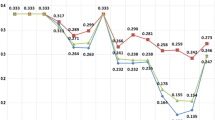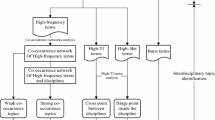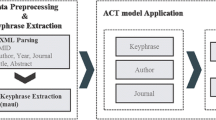Abstract
Interdisciplinary topic reflects the knowledge exchange and integration between different disciplines. Analyzing its evolutionary path is beneficial for interdisciplinary research in identifying potential cooperative research direction and promoting the cross-integration of different disciplines. However, current studies on the evolution of interdisciplinary topics mainly focus on identifying interdisciplinary topics at the macro level. More analysis of the evolution process of interdisciplinary topics at the micro level is still needed. This paper proposes a framework for interdisciplinary topic identification and evolutionary analysis based on BERTopic to bridge the gap. The framework consists of four steps: (1) Extract the topics from the dataset using the BERTopic model. (2) Filter out the invalid global topics and stage topics based on lexical distribution and further filter out the invalid stage topics based on topic correlation. (3) Identify interdisciplinary topics based on disciplinary diversity and disciplinary cohesion. (4) Analyze the interdisciplinary topic evolution by inspecting the intensity and content in the evolution, and visualize the evolution using Sankey diagrams. Finally, We conduct an empirical study on a dataset collected from the Web of Science (WoS) in Library & Information Science (LIS) to evaluate the validity of the framework. From the dataset, we have identified two distinct types of interdisciplinary topics in LIS. Our findings suggest that the growth points of LIS mainly exist in the interdisciplinary research topics. Additionally, our analysis reveals that more and more interdisciplinary knowledge needs to be integrated to solve more complex problems. Mature interdisciplinary topics mainly formed from the internal core knowledge in LIS stimulated by external disciplinary knowledge, while promising interdisciplinary topics are still at the stage of internalizing and absorbing the knowledge of other disciplines. The dataset, the code for implementing the algorithms, and the complete experiment results will be released on GitHub at: https://github.com/haihua0913/IITE-BERT.
















Similar content being viewed by others
References
Adams, J., & Light, R. (2014). Mapping interdisciplinary fields: Efficiencies, gaps and redundancies in HIV/AIDS research. PLoS ONE. https://doi.org/10.1371/journal.pone.0115092
Alvargonzález, D. (2011). Multidisciplinarity, interdisciplinarity, transdisciplinarity, and the sciences. International Studies in the Philosophy of Science, 25(4), 387–403.
Balili, C., Lee, U., Segev, A., Kim, J., & Ko, M. (2020). Termball: Tracking and predicting evolution types of research topics by using knowledge structures in scholarly big data. IEEE Access, 8, 108514–108529.
Callon, M., Courtial, J. P., Turner, W. A., & Bauin, S. (1983). From translations to problematic networks: An introduction to co-word analysis. Social Science Information, 22(2), 191–235.
Chen, B., Tsutsui, S., Ding, Y., & Ma, F. (2017). Understanding the topic evolution in a scientific domain: An exploratory study for the field of information retrieval. Journal of Informetrics, 11(4), 1175–1189.
Derrick, E. G., Falk-Krzesinski, H. J., Roberts, M. R., & Olson, S. (2011). Facilitating interdisciplinary research and education: A practical guide. In Report from the “Science on FIRE: Facilitating interdisciplinary research and education” workshop of the American Association for the advancement of science.
Dong, K., Xu, H., Luo, R., Wei, L., & Fang, S. (2018). An integrated method for interdisciplinary topic identification and prediction: A case study on information science and library science. Scientometrics, 115, 849–868.
Grootendorst, M. (2022). Bertopic: Neural topic modeling with a class-based tf-idf procedure. arXiv preprint arXiv:2203.05794.
Hall, D., Jurafsky, D., & Manning, C. D. (2008). Studying the history of ideas using topic models. In Proceedings of the 2008 conference on empirical methods in natural language processing (pp. 363–371).
Jiang, L., Zhang, T., & Huang, T. (2022). Empirical research of hot topic recognition and its evolution path method for scientific and technological literature. Journal of Advanced Computational Intelligence and Intelligent Informatics, 26(3), 299–308.
Leydesdorff, L., & Hellsten, I. (2006). Measuring the meaning of words in contexts: An automated analysis of controversies about’monarch butterflies’’,frankenfoods’,and’stem cells’. Scientometrics, 67(2), 231–258.
Leydesdorff, L., & Ismael, R. (2011). Indicators of the interdisciplinarity of journals: Diversity, centrality, and citations. Journal of Informetrics, 5(1), 87–100.
Leydesdorff, L., Wagner, C. S., & Bornmann, L. (2019). Interdisciplinarity as diversity in citation patterns among journals: Rao-stirling diversity, relative variety, and the gini coefficient. Journal of Informetrics, 13(1), 255–269.
Li, M. (2017). An exploration to visualise the emerging trends of technology foresight based on an improved technique of co-word analysis and relevant literature data of wos. Technology Analysis & Strategic Management, 29(6), 655–671.
Li, J. (2014). The concept and measurement of interdisciplinarity. Documentation, Information & Knowledge, 3, 87–93.
Ling, W., Haiyun, X., Ting, G., & Shu, F. (2015). Study on the interisciplinary topics of information science based on weak co-occurrence and burst detecting. Library and Information Service, 59(21), 105.
MacKay, D. J. (2003). Information theory, inference and learning algorithms. Cambridge University Press.
Qian, Y., Liu, Y., & Sheng, Q. Z. (2020). Understanding hierarchical structural evolution in a scientific discipline: A case study of artificial intelligence. Journal of Informetrics, 14(3), 101047.
Rafols, I., & Meyer, M. (2010). Diversity and network coherence as indicators of interdisciplinarity: Case studies in bionanoscience. Scientometrics, 82(2), 263–287.
Small, H. (2010). Maps of science as interdisciplinary discourse: Co-citation contexts and the role of analogy. Scientometrics, 83(3), 835–849.
Song, M., Heo, G. E., & Kim, S. Y. (2014). Analyzing topic evolution in bioinformatics: Investigation of dynamics of the field with conference data in dblp. Scientometrics, 101, 397–428.
Trotta, D., & Garengo, P. (2017). A co-word analysis on human resource management literature: The role of technological innovation from 2007–2017. In 20th Excellence in services international conference conference proceedings (Vol. 9, pp. 797–810).
Wu, X., & Zhang, C. (2019). Finding high-impact interdisciplinary users based on friend discipline distribution in academic social networking sites. Scientometrics, 119(2), 1017–1035.
Xu, H., Guo, T., Yue, Z., Ru, L., & Fang, S. (2016). Interdisciplinary topics of information science: A study based on the terms interdisciplinarity index series. Scientometrics, 106, 583–601.
Xu, J., Bu, Y., Ding, Y., Yang, S., Zhang, H., Yu, C., & Sun, L. (2018). Understanding the formation of interdisciplinary research from the perspective of keyword evolution: A case study on joint attention. Scientometrics, 117(2), 973–995.
Zhang, C., & Wu, X. (2017). Review on interdisciplinary research. Journal of the China Society for Scientific and Technical Information, 36(05), 523–535.
Zhang, Y., Chen, M., & Liu, L. (2015). A review on text mining. In 2015 6th IEEE International Conference on Software Engineering and Service Science (ICSESS) (pp. 681–685). IEEE.
Zhou, Z., & Wakabayashim, K. (2022). Topic modeling using jointly fine-tuned BERT for phrases and sentences. In The 14th forum on data engineering and information management
Acknowledgements
The paper is a substantially extended version of the article “Interdisciplinary Topics Extraction and Evolution Analysis” presented in the 3rd Workshop on Extraction and Evaluation of Knowledge Entities from Scientific Documents 2022 (EEKE 2022) at JCDL 2022. The authors are grateful to all the anonymous reviewers for their precious comments and suggestions.
Author information
Authors and Affiliations
Contributions
All authors contributed to the study conception and design. Material preparation, data collection and analysis were performed by Zhongyi Wang, Jing Chen, Jiangping Chen, and Haihua Chen. The first draft of the manuscript was written by Zhongyi Wang and all authors commented on previous versions of the manuscript. All authors read and approved the final manuscript.
Corresponding author
Additional information
This study is supported by National Social Science Foundation of China (Grant Number 22BTQ102).
Rights and permissions
Springer Nature or its licensor (e.g. a society or other partner) holds exclusive rights to this article under a publishing agreement with the author(s) or other rightsholder(s); author self-archiving of the accepted manuscript version of this article is solely governed by the terms of such publishing agreement and applicable law.
About this article
Cite this article
Wang, Z., Chen, J., Chen, J. et al. Identifying interdisciplinary topics and their evolution based on BERTopic. Scientometrics (2023). https://doi.org/10.1007/s11192-023-04776-5
Received:
Accepted:
Published:
DOI: https://doi.org/10.1007/s11192-023-04776-5




